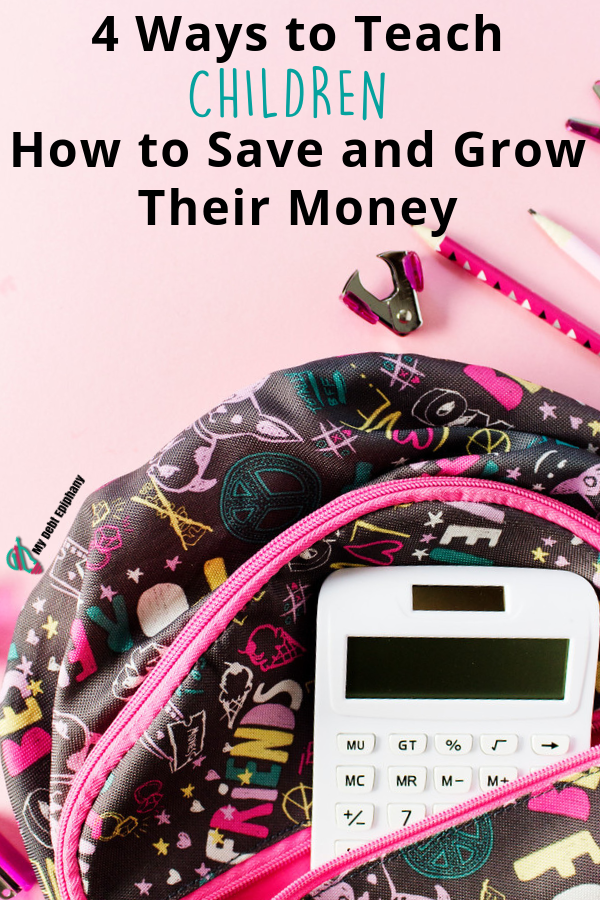Teach Children to Save with These Effortless Strategies
Today I have a guest post from Olivia Williams is a freelance writer and finance enthusiast. She is passionate about teaching people how to increase their income, manage wealth and eradicate debt.
Families have different approaches when it comes to finances and teaching kids how to handle money. Some parents opt to impose their frugal lifestyle on their kids in an attempt to teach children to save. Others tend to be more generous when it comes to providing their kids valuable life experiences.
Whether it’s dance lessons, soccer training or other forms of sports, we parents don’t mind spending hard earned money for our kids. We know that they will be benefiting from the experience or the items we purchase.
While a whole lot of us parents invest early on in our kids, it’s important to help them prepare for their financial future as well.
Setting up a trust fund in their name or opening a juvenile bank account is often not enough. It’s important to teach children to save with more hands-on tools and strategies.
These tips may come in handy if you’re planning to kick off your children’s financial journey:
Put An End to Your Open Wallet Policy
Just because you can afford to spoil your kids, doesn’t mean you always have to. If you don’t say no to them, they will always think that they can just ask mom and dad for the latest iPhone or the newest pair of sneakers.
If you have set aside a bank account for them, explain to them that if they really want that, then it has to come from their own savings.
Make them understand that this is the amount they have in the bank and how much they will have left if they keep purchasing things that are unnecessary. This way, you are giving them the power to decide if it is a smart purchase or a wasteful investment.
Don’t Be Afraid to Discuss Money Together
It’s been said many times in many ways, there is no such thing as too early to talk about money with your children. Financial literacy is one of the best gifts for kids and instead of always turning them away during discussions on financial topics, start including them in conversations where they could pick up something they can use along the way.
Don’t worry that they might not understand every single thing you say. As you go along and over time, they will start developing a sense of interest. When this begins, they will start paying attention to discussion and pick-up tips and lessons from adult financial conversations.
Related: Popular Games that Teach Kids About Money
Practice What You Preach
You can’t say one thing and do another, especially with children. They follow what they see and what their parents say and this applies to a wide variety of ideas including spending.
If you keep telling your kids they should value money and they should spend smart but they see you splurging all the time, then chances are they won’t believe what you say. Again, kids do what they see from adults. If you want to create a positive influence on them, be a positive example.
Stand By Your Word
When you put a rewards system in place, make sure that you follow the terms you and your child agreed upon. This way, your kids will trust you no matter what. If you promise them that you will buy them something that they really like if they do well in school, then by all means, do so. This will instill the value of money in their young minds.
While many parents do not implement the rewards system at home, they substitute it with other rules such as paying kids a set amount for chores that they will complete on a daily basis.
This will not only teach kids to be wise with their money, but they will also develop the habit of weighing their options before they spend.
If they knew that $5 would mean washing the dishes every day for a week, they will think twice before splurging it on unnecessary things. Don’t feel guilty about assigning chores and providing monetary rewards, your kids may hate you for some time, but they will understand why you raise them that way.
Again, parents differ from families to families, so are kids.
What might work for your home might not necessarily work for a friend’s home and vice versa. But ultimately, with the same endgame in mind—that is your kids financial management—do whatever you can, as soon as you can, to teach them when to save and when to spend.

Stop Worrying About Money and Regain Control

Join 5,000+ others to get access to free printables to help you manage your monthly bills, reduce expenses, pay off debt, and more. Receive just two emails per month with exclusive content to help you on your journey.





